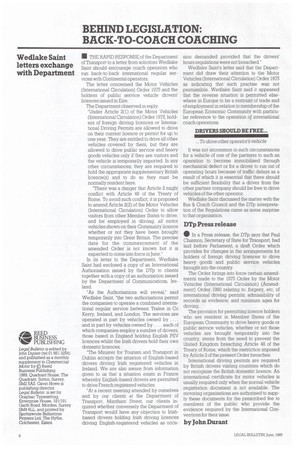BEHIND LEGISLATION: BACK-TO-COACH COACHING
Page 106

If you've noticed an error in this article please click here to report it so we can fix it.
Wedlake Saint letters exchange with Department
• THE RAPID RESPONSE of the Department of Transport to a letter from solicitors Wedlake Saint should encourage coach operators who run back-to-back international regular services with Continental operators.
The letter concerned the Motor Vehicles (International Circulation) Order 1975 and the holders of public service vehicle drivers' licences issued in Eire.
The Department observed in reply: "Under Article 2(1) of the Motor Vehicles (International Circulation) Order 1975, holders of foreign driving licences or International Driving Permits are allowed to drive on their current licence or permit for up to one year. They are entitled to drive all other vehicles covered by them, but they are allowed to drive public service and heavy goods vehicles only if they are visitors and the vehicle is temporarily imported. In any other circumstances, they are required to hold the appropriate supplementary British licence(s) and to do so they must be normally resident here.
"There was a danger that Article 2 might conflict with Article 48 of the Treaty of Rome. To avoid such conflict, it is proposed to amend Article 2(2) of the Motor Vehicles (International Circulation) Order to allow visitors from other Member States to drive, and be employed in driving, all motor vehicles shown on their Community licence whether or not they have been brought temporarily into Great Britain. The precise date for the commencement of the amended Order is not lmown but it is expected to come into force in June."
In its letter to the Department, Wedlake Saint had enclosed a copy of an International Authorisation issued by the DTp to clients together with a copy of an authorisation issued by the Department of Communications, Ireland.
"As the Authorisations will reveal," said Wedlake Saint, "the two authorisations permit the companies to operate a combined international regular service between Tralee in Co Kerry, Ireland, and London. The services are operated in part by vehicles owned by. . and in part by vehicles owned by . . . . each of which companies employ a number of drivers, those based in England holding English PSV licences whilst the Irish drivers hold their own domestic licences.
"The Minister for Tourism and Transport in Dublin accepts the situation of English-based drivers driving Irish registered vehicles in Ireland. We are also aware from information given to us that a situation exists in France whereby English-based drivers are permitted to drive French registered vehicles.
"At a recent meeting attended by ourselves and by our clients at the Department of Transport, Marsham Street, our clients inquired whether conversely the Department of Transport would have any objection to Irishbased drivers holding Irish driving licences driving English-registered vehicles as occa sion demanded provided that the drivers' hours regulations were not breached."
Wedlake Saint's letter said that the Department did draw their attention to the Motor Vehicles (International Circulation) Order 1975 as indicating that such practise was not permissible. Wedlake Saint said it appeared that the reverse situation is permitted elsewhere in Europe to be a restraint of trade and of employment in relation to membership of the European Economic Community with particular reference to the operation of international coach operations.
DRIVERS SHOULD BE FREE...
To drive other operator's vehicle It was not uncommon in such circumstances for a vehicle of one of the partners to such an operation to become immobilised through mechanical defect or for a driver to run out of operating hours because of traffic delays as a result of which it is essential that there should be sufficient flexibility that a driver from the other partner company should be free to drive vehicles of the other operator.
Wedlake Saint discussed the matter with the Bus & Coach Council and the DTp interpretation of the Regulations came as some surprise to that organisation.
DTp Press release
• In a Press release, the DTp says that Paul Channon, Secretary of State for Transport, had laid before Parliament, a draft Order which provides for changes in the arrangements for holders of foreign driving licences to drive heavy goods and public service vehicles brought into the country.
The Order brings into force certain amendments made to the 1975 Order by the Motor Vehicles (International Circulation) (Amendment) Order 1980 relating to: forgery, etc, of international driving permits; admissibility of records as evidence; and minimum ages for driving.
The provision for permitting licence holders who are resident in Member States of the European Community to drive heavy goods or public service vehicles, whether or not those vehicles are brought temporarily into the country, sterns from the need to prevent the United Kingdom breaching Article 48 of the Treaty of Rome, which the restriction imposed by Article 2 of the present Order breaches.
International driving permits are required by British drivers visiting countries which do not recognise the British domestic licence. An international certificate for motor vehicles is usually required only when the normal vehicle registration document is not available. The motoring organisations are authorised to supply these documents for the prescribed fee to members of the public who provide the evidence required by the International Conventions for their issue.
by John Durant












































































































































